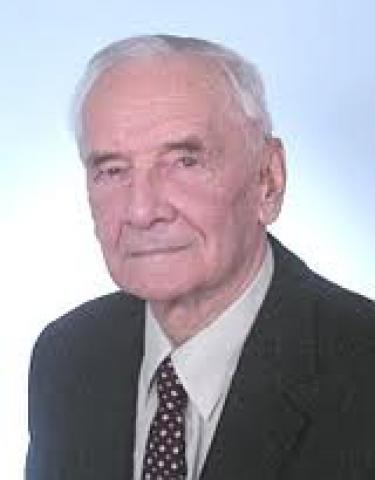It is with deep regret that we inform you about the passing of Professor Wojciech Królikowski. He passed away on 29th April 2019. He Was an outstanding physicist closely connected to our institute and a full member of Polish Academy of Sciences.
For students of physics of several generations, Professor Królikowski Was, together with Wojciech Rubinowicz, an author of a textbook „Theoretical mechanics” first published in 1955, and then subsequently re-released nine times. I Was using it as a student, then it came in handy when I Was preparing my lectures and now I’m reading it when I want to check, for example, Hamilton-Jacobi equation. And yet, this legendary textbook is only a small part of Professor’s legacy, an episode of an early era of his brilliant career.
Wojciech Królikowski Was born on 16th July 1926 in Warsaw. He studied physics on University of Warsaw. In 1950 he received the master’s degree, and after only two years, the title of Doctor, working under the guidance of Professor Wojciech Rubinowicz – one of the most prominent Polish theoretical physicists. He received the title of Assistant Professor in 1957, and in 1965 – he became a Professor. In 1969 he Was elected as a corresponding member of Polish Academy of Sciences. He became a real member 11 years later. In 1987 he Was awarded a Marian Smoluchowski Medal – the highest recognition of Polish Physical Society.
Professor Królikowski had a wide net of international contacts, he conducted research in the famous ETH Zurich, Institute for Advanced Studies in Princeton, European Centre for Nuclear Research (CERN) in Geneva, and, last but not least, International Centre for Theoretical Physics (ICTP) in Trieste. Nevertheless Professor’s whole professional life Was tied with Warsaw and University of Warsaw. Between 1958 and 1970 he Was working in Institute for Nuclear Research, the predecessor of NCBJ, being the head of Atomic Nucleus and Elementary Particles Theory Division.
Professor Królikowski initiated the Warsaw’s research into the smallest building blocks of matter, he Was a „father” of theoretical elementary particle physics in the city. His scientific achievements include over 200 articles, some of which are truly pioneering. He formulated a hypothesis of muon neutrino, which Was confirmed soon after, he introduced colour as a new quantum number describing quarks. He also contemplated on leptons and quarks being bound states of even more elementary objects.
He never insisted on promoting his results and, as such, many of them went unnoticed and not appreciated enough. Even when renewing his PhD, his occasional lecture didn’t focus on his own career, his history of success and failure, but rather the achievements of physics during the fifty years that passed since he graduated with his diploma. He worked with perseverance, usually alone, he also remained active in the scientific community until old age. Publication of the last article, which Was by no means an easy work, but rather required meticulous calculations regarding a modern problem of elementary particles, coincided with his ninetieth birthday.
Always elegant, in a suit, often with a tie, Professor Was moving about with a distinctive relaxed stride. His manners reflected his attire – he Was incredibly courteous, polite to both young and old, however he always kept his distance. On the seminars he always asked his questions elegantly, never aggressively.
I remember before my PhD, I came to speak with Professor about my fresh idea. I rambled about the Higgs boson and tachyons – hypothetical faster than light particles – and Professor bravely endured it. He didn’t tell me that I’m talking nonsense, I had to figure it out myself.
For long years, Professor Królikowski seemed like a permanent and indelible element of the physics on Hoża street, where, in the pavilion across from the library, he had his room. During the latest years he visited this place less and less frequently and now, the Physics moved out from Hoża street, closing an era, which Professor Królikowski co-created.
Stanisław Mrówczyński





